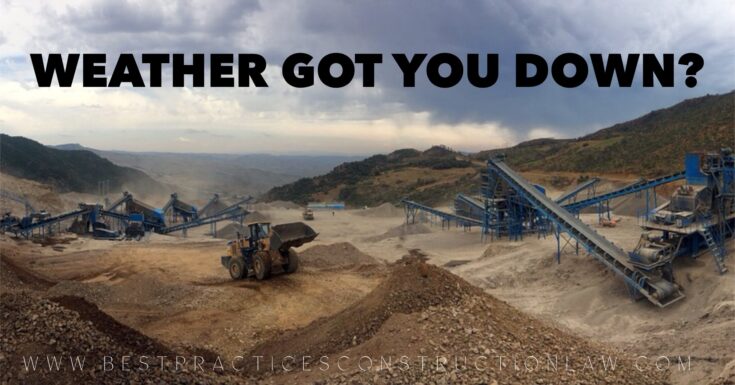Matthew DeVries | Best Practices Construction Law
Picture this: A contractor is nearly finished with a major dam stabilization project, but a series of Owner-directed changes pushes the last phase of the work into late fall and early winter. Instead of working through the relatively dry conditions expected in the original schedule, the contractor is suddenly battling weeks of rain and freezing temperatures. Crews are slowed, costs increase, and productivity suffers.

That’s exactly what occurred in the recent decision of Thalle Construction Co., ASBCA Nos. 63685, 63721, 63734 (Aug. 13, 2025). In that case, the Armed Services Board of Contract Appeals recognized that government delays had arguably pushed the contractor’s performance into a period of worse seasonal adverse weather than it would have faced under the original schedule. The Board distinguished between two types of weather:
- Seasonal adverse weather: Normal, recurring patterns like rainy seasons or winter freezes, which are foreseeable and must be built into a contractor’s plan. If government delay extends performance into these months, the contractor may recover additional time and compensation.
- Unusually severe weather: Extraordinary, unforeseeable events such as record-breaking storms or extreme floods. Under standard clauses, this type of weather typically entitles the contractor to time only (excusable delay), not money.
In Thalle, the Board concluded that a contractor may pursue recovery when a government-caused delay pushes performance into a worse seasonal weather window, because that kind of risk is foreseeable and measurable. By contrast, when performance is delayed into unusually severe weather, the contractor is entitled only to schedule relief, not compensation, since such extremes cannot reasonably be anticipated. This distinction was critical in allowing the contractor’s weather claim to proceed.
So how can contractors protect themselves? One way is to negotiate contract language that clearly addresses both categories of weather. Consider a provision such as:
“Contractor shall be entitled to an equitable adjustment in both time and price if Owner-caused delays extend performance into a period of increased seasonal adverse weather, as measured by the anticipated adverse weather days in Exhibit __. In the event of unusual adverse weather, Contractor shall be entitled to a time extension, and if such weather coincides with Owner delay, Contractor shall also recover compensable costs.”
This kind of clause allocates risk fairly, sets expectations for both parties, and reduces disputes over whether weather-related impacts are compensable.
In other words, the difference between staying on track and falling victim to the elements often comes down to clear drafting. Contractors who plan ahead and address seasonal and unusual weather in their contracts won’t find themselves caught in the storm unprotected.
When one of your cases is in need of a construction expert, estimates, insurance appraisal or umpire services in defect or insurance disputes – please call Advise & Consult, Inc. at 888.684.8305, or email experts@adviseandconsult.net.
